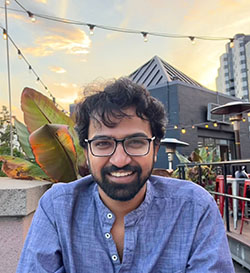Abhimanyu Acharya
Full-Time Writer, Accidental Translator
By Busra Copuroglu
Abhimanyu Acharya, a Ph.D. candidate in Comparative Literature at Western and a playwright, spent the first year of his undergraduate studies in the science department at St. Xavier’s’ College in Ahmedabad, Gujarat, India. He was an avid reader and was writing fiction while dreaming of being a physicist. During this first year of his studies, however, his interest in physics started to wane, and his interest in the questions that were asked in literature departments started to grow. He switched majors in the second year of his undergraduate studies and started a B.A. in English, then went on to complete an M.A. at the Manipal Centre for Humanities in English and he has recently completed his Ph.D. in Comparative Literature at Western with a dissertation on modern Indian Theatre and is now heading to SAWITRI Theatre Group to start a position as Assistant Artistic Director.
Acharya is fluent in Gujarati, Hindi, and English, and during his M.A. he specifically wanted to work on non-English literature from his region in India. “India has 22 languages and there are writers who write in these languages. So, I had this regional tradition with me. I thought not many people were working on literature in Hindi or in Gujarati, so I wanted to work on them,” he said. Acharya then wrote his M.A. thesis on the famous Hindi playwright and novelist Mohan Rakesh. “It was a life-changing experience,” he recalled.
After his M.A., with the encouragement of his professors to continue his work on regional, non-English Indian literature, he decided to apply to Ph.D. programs abroad. “I never thought that you could work on regional literature. I always thought countries like Canada, the U.S. or the U.K. were only interested in writers who write in English,” he remarked. He then came to Western to work with Dr. Nandi Bhatia and enrolled in the Comparative Literature program. One of the things he enjoyed during his studies at Western, Acharya noted, is “the freedom of thinking independently and also rigorously about texts.”
Acharya’s dissertation examines the politically charged aesthetics of Gujarati theatre in Colonial West India, between 1850-1914, a period when British rule was consolidated in India. His project traces the development of modern Gujarati theatre and shows how complex socio-political ideologies that were imposed during British rule made theatrical aesthetics a ground to assert and subvert regional, folk, nationalist, caste, and gendered identities. “This is the first comprehensive study on Gujarati Theater in English,” he said.
Breaking the Binaries of Writing
The intersection of aesthetics and politics not only informs Acharya’s scholarly work but also has long been a prevalent theme in his creative writing. His plays and stories combine themes of racism, colonialism, caste and class issues, love, and sexuality, and more recently Acharya’s writing has been increasingly dealing with the present forms of colonialism, migration, and refugee crisis.
Before coming to Canada, Acharya was already a prolific writer in India. His plays have been performed in Mumbai, Bangalore, Ahmedabad and Manipal. He has won the Sanhita Manch playwriting award 2020 (Mumbai), Gujarat Sahitya Academy Best Book Prize, the Sahitya Akademi Yuva Puraskar 2020 (award for young writers granted by the National academy of Letters, India) and he was twice longlisted for Toto Funds the Arts (TFA) award for creative writing in English (Bangalore).
Over the course of his academic work, he said, he discovered that both modes of writing “helped each other in terms of technique and structuring.” His Ph.D. dissertation (250 pages), which is the longest piece of writing he has ever done, also trained him in thinking about structure and how to write long works, like novels. “My creative writing started way before I started writing scholarly works. I always thought scholarly writing was for scholars and wouldn’t touch general audiences and that people wouldn’t be interested in reading a Ph.D. work. But during my Ph.D., this binary has been broken and I have found ways to make scholarly writing accessible” he added.
Debut as a Playwright in Canada
During his Ph.D. studies, Acharya continued to write plays. His plays Hopscotch and Boundaries have been performed at the Mississauga Multilingual Fringe Festival (2021 and 2022) and London Fringe Festival (2022).
performed at the Mississauga Multilingual Fringe Festival (2021 and 2022) and London Fringe Festival (2022).
Acharya’s introduction to the theatre scene in Canada happened through a series of serendipitous collaborations. While at Western, he reviewed Canadian and Indian plays for a U.S. online magazine called The Theatre Times. During this time, he also submitted one of his plays to a South Asian theatre company called Sawitri Theatre in Mississauga, whose plays he had reviewed for The Theatre Times. He then reached out to the directors of the theatre company and sent his plays. When he heard that his plays were selected to be performed, he published a call for directors. At the time he was working as a teaching assistant for Kim Solga in English Studies, and a student in the class, Alexandra Rizkallah, an up-and-coming theatre director who had worked as an assistant director at the Grand Theatre, responded to his call and directed his plays. “She would be my first choice for future collaborations,” Acharya noted.
Breaking into the theatre world in Canada, however, has challenges for Acharya. In addition to the common difficulties of making-it-as-a-writer, as an international student, an added obstacle, he noted, is the issue of his citizenship as most theatre companies and competitions require permanent residency or Canadian Citizenship.
(Accidentally) Becoming a Translator
Alongside his scholarly and creative writing, Acharya also translates works between Hindi, Gujarati, and English. Aspiring to be a writer, at age 16 he first was translating the works of his favourite authors as a leisurely activity to teach himself how to write. “I think translation is the best way to engage with writers’ work because you really have to read the text very closely in order to translate it. That’s what really gave me an insight into that craft,” he explained.
As the translations he did for himself and shelved on his computer started to grow, he decided to submit them to magazines to get them published in India, and over time, translation projects started pouring in. “So, I became a translator sort of by accident. I’ve never had the ambition to be a translator,” he said. With Bhatia, Acharya is now translating a book on the India and Pakistan partition from Hindi into English. In addition to a scholarly translation project, he is also translating a play by Lilavati Munshi, one of the first woman playwrights in Gujarati.
Some of the writers who inspire Acharya:
Virginia Woolf, Arundhati Roy, Jhumpa Lahiri, and Dalit authors Dalpat Chauhan and Sharankumar Limbale
 About our Contributor
About our Contributor
Busra Copuroglu is a Ph.D. candidate in Comparative Literature with a background in French Studies. Her current doctoral dissertation, in progress, is about literary depictions of boredom and complaint from the late nineteenth century to the present.







